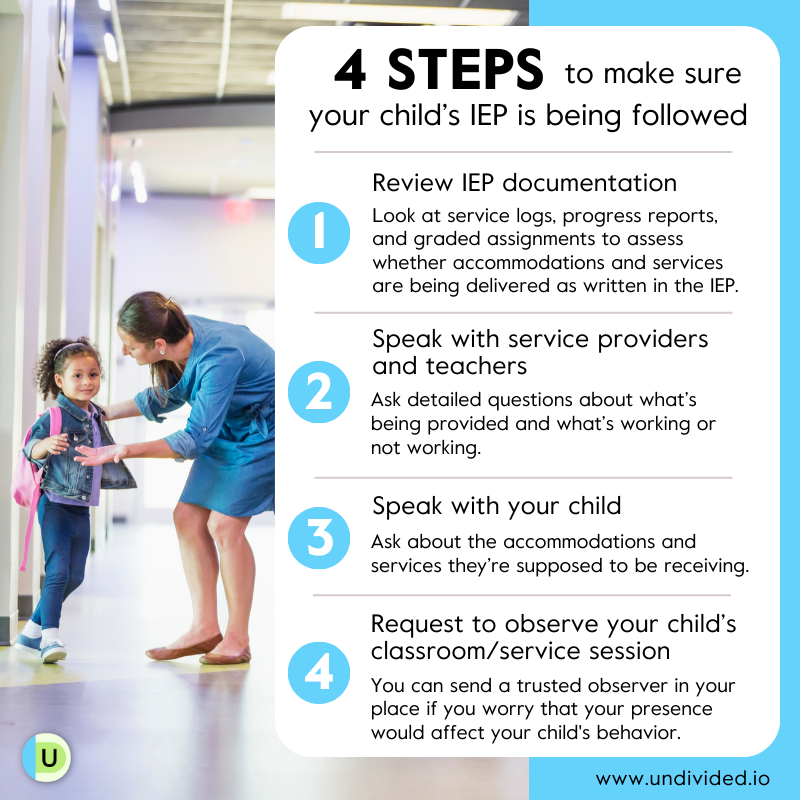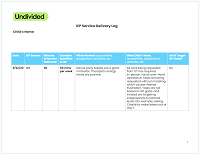How to Make Sure Your IEP Is Being Followed (and What to Do If It Isn’t)
Congratulations! Your IEP is signed and you’re happy with the services, goals, accommodations, and plan of action. However, so much of what happens at school is out of your view. How do you know if your child’s IEP is being implemented in all the ways the team agreed it should be? What steps do you take if it turns out your child is not receiving the services, accommodations, or focus on goals that they need? We spoke with educational advocate and consultant Kelly Rain Collin, Special Education Advocate and Owner of KnowIEPs, Dr. Sarah Pelangka, and Undivided's Education Advocate Lisa Carey to learn more.
Review IEP documentation
As Collin tells us, “If it is not written, it doesn’t exist.” Just as you did when you took the time to review your child’s IEP, you’ll want to continue to carefully document everything and review any important paperwork you receive.
Progress reports
Progress reports should be sent to you multiple times a year, possibly with your child’s report cards. These reports should contain your child’s present levels of performance (PLOP), their goals, and number data representing their progress. According to Carey, some progress monitoring reports lack detail or contain language that is hard to understand. She suggests requesting a meeting with your child’s service providers or teachers to discuss what is written in the report in more detail. If your child's progress reports indicate little progress, or if you have other reasons to think service are not being provided, then you could request service logs.
Service logs
Service logs aren't routinely provided, but you can request them if you suspect that services aren't happening as agreed upon in the IEP. Here's a sample letter you can use to request service logs if you have concerns about your child's services.
Service logs will show you the dates that a provider, such as a speech therapist, worked with your child and for how long. You can compare the minutes logged with your child’s provider against the minutes listed in their IEP to see if they match. If you're an Undivided member, you can use this printable service delivery log template to track services:
Work samples
Carey suggests looking over your child’s homework and graded assignments. For example, if your child’s IEP states that they should have fewer problems per page, whether or not this provision is being followed will be evident by the worksheets they bring home.
Speak with service providers and teachers
Following up on accommodations
For some types of accommodations, it can be trickier to determine if they are being followed as there isn’t any documentation for you to review. Carey suggests speaking directly to your child’s teachers and service providers and asking detailed questions.
For example, if your child has sensory breaks written into their IEP, you can ask their teacher, “How are their breaks going?” or “How do you know when my child needs a break?” You could also ask, “Is my child asking for breaks, or is someone else asking on their behalf?” Asking prompting questions can give you a good idea of what is going on and alert you to any red flags, such as the teacher being unable to answer your questions. For more on this topic, see our article What to Do If Teachers Aren’t Implementing IEP Accommodations.
By opening a dialogue with your child’s teacher about specific details of their IEP, you may find that some provisions are working better than others. For example, if the teacher is following the provision that your child be given preferential seating and has seen reduced engagement, that gives you and the IEP team essential feedback that can help you refine the IEP for better outcomes. (It’s important to note, however, that the school is still legally required to follow all aspects of your child’s IEP and should not make any changes to the way it is implemented without your consent.)
Following up on goals
Speaking with school staff can also help you better understand how your child’s goals are being worked on. What is being done in class or sessions with providers to meet their goals? Collin suggests asking specific questions about your child’s progress and what the teacher means when they say “progress.” The term can sometimes be misleading without context. (Here's a sample letter that shows how to document conversations with the staff, which may be helpful to review during the next IEP meeting.)
Collin tells us that if it looks like one of your child’s goals will not be achieved during the school year, the district is supposed to call an IEP meeting to discuss why that is the case. If they do not, it is a good idea for you to do so. It could be that your child’s goals are not being met because parts of their IEP are not being followed or are not working as intended.
Speak with your child
Not all children will be able to communicate whether their IEP is being followed, but if your child can, it’s a good idea to ask them about the particulars, especially if they are older. For example, if their IEP says they should be seated near the teacher at the front of the room, ask your child whether they are. If they say no, you can reach out to the teacher to find out why. It can also be a great way to educate your child on what is in their IEP and encourage them to advocate for themselves.
Request to visit your child’s classroom
A classroom visit can be a great way to get an idea of how your child’s accommodations are being implemented. If you are not able to observe your child’s classroom yourself, you can ask (or hire) someone you trust to do it for you. Collin says that anyone with the skill set needed to understand your child’s accommodations can fill the role, whether they’re an advocate, a psychologist, or a friend.
She adds that some schools are more willing to set up observations than others, and suggests speaking with your child’s teacher or principal beforehand.
As Dr. Sarah Pelangka explains in this clip, you can also request to observe your child's service sessions (or send an observer in your place if you worry that your presence would affect your child's behavior during the session):
Ensure my child's Individualized Education Program (IEP) is being followed
What to do if your IEP isn’t being followed
As we state in our IEP 101 article on parental participation and procedural safeguards, the law provides several ways for parents to resolve disputes, including mediation, a resolution session, due process hearings, or a state complaint.
Note that each district has its own policies and procedures, so the process may vary from district to district, but the following are some options you might consider if you have determined that your child’s IEP is not being followed:
Request an informal meeting to address the issue directly. You can reach out to your child’s teachers or service providers to discuss the provision of your child’s IEP that isn’t being followed. Why isn’t it being followed? What can be done going forward to ensure that it is? Having an informal meeting is a great way to start a dialogue and find a solution. For example, if your child's therapy minutes weren't provided for several months due to a lack of qualified staff, the IEP might offer compensatory education during an informal meeting.
Request a formal IEP meeting to discuss the issue with the entire IEP team. It’s also a good idea to set up a team check-in about thirty days after the initial meeting to see how things are going and ensure that the issue was truly resolved.
Request mediation, in which a qualified third party will mediate the resolution process.
Request alternative dispute resolution (ADR): This is an informal process that is used to come to an agreement. (It is important to note that you will not lose the right to go to due process by requesting ADR.)
File a complaint with the district or your Local Education Agency (LEA).
File a complaint with your state's department of education, which will investigate your complaint.
File for due process, a legal proceeding in which the parents and district will discuss the issue with a hearing officer. During the hearing, both the parents and district will have an opportunity to present evidence, call witnesses, and make arguments. A hearing is similar to a trial where the hearing officer will act as the judge. Before an official hearing, there will typically be:
- a resolution session within the first fifteen days, which is an opportunity for the district and parent to come to an agreement
- mediation
- a prehearing conference to discuss the date and time of the hearing, issues to be discussed, what witnesses may be present, and any necessary accommodations that participants may require.
You might also consider enlisting the support of Undivided, a special education attorney, or an advocate if you feel you need support understanding your rights or navigating the system. Remember:
- Advocates can attend IEP meetings and help you to understand test results and IEPs.
- Attorneys can give legal advice and assist you in preparing for a due process hearing.
- Both advocates and attorneys can help you reach collaborative solutions with the district, review documents, and understand your rights. They can also send letters or emails on your behalf.
There are several organizations that can help parents through these processes, such as your local Parent Training and Information Center (PTI) or Family Empowerment Center. If you live in California, Disability Rights California also has excellent information and resources to help parents navigate these situations.
Resolve a dispute with my IEP team
Join for free
Save your favorite resources and access a custom Roadmap.
Get StartedAuthor





